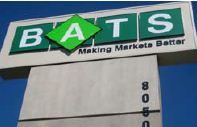The ongoing Securities and Exchange Commission order type investigations into BATS and Direct Edge have reached their respective conclusions.
The two cases, made by the SEC before BATS Trading purchased Direct Edge, are now over, according to statement from BATS Trading. With regards to BATS, the regulator has concluded its investigation with no action taken.
With respect to Direct Edge, the SEC is taking an enforcement action against the legacy Direct Edge exchanges with respect to functionality that was implemented prior to the acquisition by BATS. According to BATS, it entered into a settlement agreement with the SEC, without admitting or denying the allegations, in order to put this matter behind it.
BATS Global Markets have agreed to pay a $14 million penalty to settle charges that their rules failed to accurately describe the order types being used on the exchanges. The penalty is the SEC’s largest against a national securities exchange, and the case is the SEC’s first principally focusing on stock exchange order types.

According to BATS, the SEC does not allege that there was anything inherently inappropriate about the order type functionality. Rather, the SEC alleged that the price sliding functionality was not completely and accurately disclosed in Direct Edge’s rules.
“We have cooperated with the SEC staff throughout both investigations, and thank the staff for their thoughtful consideration and discussion of the relevant facts and policy issues,” BATS Trading said in a statement.
According to the SEC, it found that while operating under rules that described a single “price sliding” process for handling buy or sell orders, the EDGA Exchange and EDGX Exchange actually offered three variations of “price sliding” order types. The exchanges’ rules did not completely and accurately describe the prices at which those orders would be ranked and executable in certain circumstances, and they also failed to describe the execution priority of the three order types relative to each other and other order types. The SEC’s investigation further found that the exchanges separately disclosed information about how those order types operated to some but not all of their members.
“These exchanges did not properly describe in their rules how their order types were functioning,” said Andrew Ceresney, director of the SEC’s Division of Enforcement in a public statement. “They also gave information about order types only to some members, including certain high-frequency trading firms that provided input about how the orders would operate. Exchanges must ensure that their order types are described accurately in their rules and communications to all members.”
As a result, the SEC’s order finds that the EDGA and EDGX exchanges violated Sections 19(b) and 19(g) of the Securities Exchange Act of 1934.
Aside from the censure and fine, EDGA and EDGX also agreed to comply with various undertakings, including a requirement that they develop new policies and procedures relating to the development of, rule filing process for, and communication of information regarding order types.
BATS established a reserve for the SEC settlement as part of the Direct Edge acquisition and the impact is already reflected in its third quarter financial statements.



